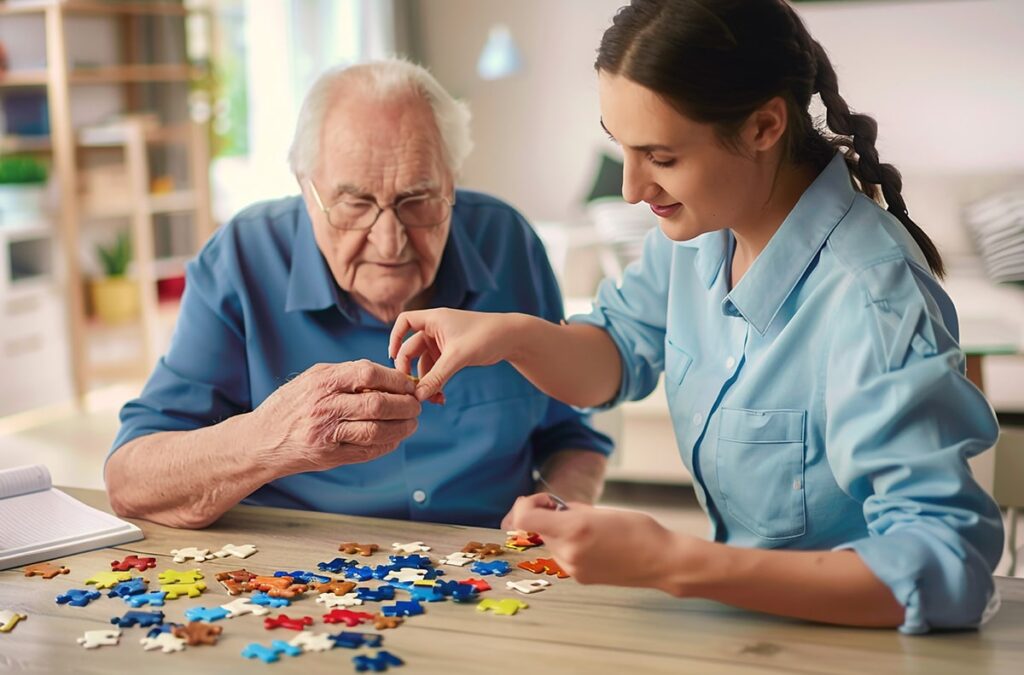Alzheimer’s and other forms of dementia impact millions of older adults and their families each year; in fact, 11% over the age of 65 — over 150,000 — are experiencing the condition throughout Arizona.
Understanding these conditions is the first step toward finding the right care and support. At Barton House in Scottsdale, Arizona, we provide long-term memory care with cost-effective pricing, offering families peace of mind during challenging times.
We’ll explain what the different types of Alzheimer’s and dementia are like, as well as how elders and their families can seek help in Scottsdale.
What Is Dementia?
Dementia is a general term for a decline in cognitive abilities severe enough to interfere with daily life. Memory loss is often the hallmark symptom, but dementia can also affect reasoning, language, and behavior. Although Alzheimer’s is a very well-known form of dementia, there are several other types that families should be aware of.
If you’re currently wondering which of the following conditions your loved one may have, please learn more by contacting a medical professional for an official diagnosis and personalized advice.
The Different Types of Alzheimer’s and Dementia
Alzheimer’s
The most common form of dementia, Alzheimer’s accounts for 60 to 80 percent of cases. It is characterized by progressive memory loss, confusion, and setbacks with problem-solving and communication. Early symptoms often include forgetting recent events or conversations, while later stages may involve severe memory impairment and loss of independence.
Subtypes of Alzheimer’s are:
- Early-Onset Alzheimer’s: Seen in individuals under 65 years old and often has a genetic component.
- Late-Onset Alzheimer’s: The most common subtype, typically diagnosed in those over 65.
- Familial Alzheimer’s (FAD): A rare inherited subtype caused by specific genetic mutations.
Vascular Dementia
Often caused by strokes or other conditions that reduce blood flow to the brain, vascular dementia is the second most common type of dementia. Symptoms vary depending on the area of the brain affected but may include trouble with planning, decision-making, and balance.
Lewy Body Dementia (LBD)
LBD involves abnormal protein deposits called Lewy bodies in the brain. It can cause symptoms such as visual hallucinations, sleep disturbances, and movement difficulties similar to Parkinson’s (which itself can also lead to dementia), along with cognitive decline.
Frontotemporal Dementia (FTD)
FTD primarily affects the frontal and temporal lobes of the brain, which are responsible for personality, behavior, and language. Individuals with FTD may experience personality changes, loss of empathy, or obstacles with speech and understanding language.
Subtypes of FTD include:
- Behavioral Variant FTD: Influences personality and behavior.
- Primary Progressive Aphasia (PPA): Impacts language skills, including speaking and understanding.
- FTD Movement Disorders: Includes conditions like corticobasal syndrome and progressive supranuclear palsy.
Mixed Dementia
In some cases, people may have a combination of Alzheimer’s, vascular dementia, or other types of dementia. Symptoms can overlap, making diagnosis more complex.
Other Forms of Dementia
- Huntington’s Dementia: Huntington’s disease is a genetic disorder interfering with motor control and cognitive functions.
- Creutzfeldt-Jakob Disease (CJD): A rare, rapidly progressing condition caused by abnormal prion proteins.
- Parkinson’s Dementia: Sometimes develops with advanced Parkinson’s.
- HIV-Associated Dementia: Occurs in advanced stages of HIV/AIDS.
- Wernicke-Korsakoff Syndrome: Caused by a deficiency in vitamin B1 (thiamine), often linked to alcohol misuse.
- Normal Pressure Hydrocephalus (NPH): Caused by a buildup of cerebrospinal fluid in the brain.
- Posterior Cortical Atrophy (PCA): Is very rare and affects visual processing.
Seeking Help for Dementia in Scottsdale
Navigating a dementia diagnosis can be overwhelming, but Scottsdale offers a wealth of resources for families seeking support. Here are some options:
Professional Memory Care Services
Barton House specializes in long-term memory care exclusively for people with Alzheimer’s and other forms of dementia.

Support Groups
Local organizations like the Alzheimer’s Association Desert Southwest Chapter provide support groups for caregivers and families. These groups offer a chance to share experiences, learn coping strategies, and connect with others who sympathize with the journey.
Medical Experts
Scottsdale is home to leading neurologists and geriatric specialists who can provide comprehensive care plans and guidance for managing dementia symptoms.
Community Resources
Programs like adult day care centers and respite care services can provide temporary relief for caregivers while ensuring older adults receive proper attention.
Why Choose Barton House?
At Barton House, we’re very familiar with the unique challenges that come with caring for a loved one who has dementia.
Our Scottsdale community is designed to support older adults at every stage of their journey, with transparent pricing and quality memory care. From personalized care plans to engaging activities, we’re here to help your loved one flourish in an understanding environment.
Take the First Step
If you’re seeking Scottsdale Alzheimer’s care or support for dementia, reach out to Barton House today. Together, we’ll create a care plan for your loved one that provides your family with peace of mind.

